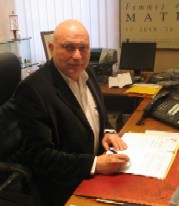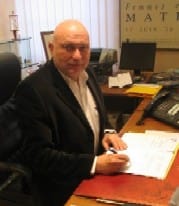André Barthe, Deputy for Culture of the city of Nice, agreed to meet with Nice Première. In his office in Old Nice, he answers questions about his profession and also on current topics.

André Barthe: It’s stressful from the morning. I get up at 6 AM and finish around 10 PM. At 8:30 AM, I set up the day’s schedule with my coworker: attending work meetings, answering calls, taking calls, listening to people’s projects, and handling grant requests.
Sometimes it is necessary to travel to Paris or Aix en Provence and meet with city services. I also attend inaugurations, which usually happen around 6 PM. Not to forget the visits to cultural centers and attending association meetings. Lunch break sometimes consists of a good meal, other times a sandwich bought from the corner of the street.
Ultimately, the schedule is quite full.
NP: Since early February, you have also been Deputy for the Three Hills territory. Can you tell us a little about that?
AB: I deliberately left the human resources delegation. This new post is more dynamic. I am more in contact with the population, and I like it. I work with the “active forces” of the districts, I listen to them, I dialogue, and then carry out projects. It’s community engagement work. It’s exciting! The areas I deal with vary: noise issues, traffic, assistance to the municipal police, meetings with community council presidents, etc.
NP: If the opportunity arose, would you welcome a change of delegation, or do you wish to stay in the cultural field?
AB: If I can, I will stay in the cultural field. I have been Deputy for Culture for thirty years. It’s a real passion.
NP: Do you think culture holds a sufficiently important place in the city of Nice?
AB: The deputy that I am will tell you that there should be more. But if we look closely, 13% of the city’s budget is allocated to culture. So, I think that’s already quite good. Especially when you know that in France, culture is the second largest job creator after the automotive industry. In Nice, in particular, of the 6780 employees, more than 1100 are employed in cultural affairs.
In Nice, over the past twenty years, two cultural buildings have been opened every year. This shows that this domain is a value addition for the city. Moreover, I am convinced that people don’t come to Nice just for the beach. There are beaches elsewhere too.
NP: Do you go to concerts, theater, opera out of pleasure or obligation?
AB: I admit: sometimes I don’t feel like going, often due to fatigue. But when I’m there, it’s almost always a great pleasure. I get captivated by the play, by the voice, by the stage. This is striking and admirable. So it’s really for pleasure, even if sometimes, at the start, I think I would be better off at home. So nine times out of ten, I’m very happy to have attended. And when I don’t like it, it’s a matter of sensitivities, of preferences.
However, I don’t impose my tastes on the city. In Nice, there are qualified people (curators, directors) to choose what should be presented in Nice or not. I am a bit like a conductor, setting up and staging the whole cultural life. That is, finding the money, the building, the staff, the talent, but certainly not to decide in place of the specialists. I do all this in agreement with all the directors who are free to present whatever they want. And also with the cultural commissions and the central director of cultural affairs, Thierry Martin.
NP: For you, what is the purpose of culture?
AB: In my eyes, culture is essential for humans. It fosters tolerance and enables a better understanding of the world. Ultimately, it is necessary for human flourishing.
NP: Do you have any projects in mind to propose?
AB: I would like to organize a cultural event rather than buildings. For example, art in the streets, developing contemporary music.
My wish is to cover the Verdure Theater. I find it a pity that it is not covered and cannot be used all year round.
NP: What projects are planned for soon?
AB: The transformation of the Spada hall, a new wasteland site. It should allow, in the next 4/5 years, the creation of new types of facilities for new cultural forms.
Soon, the construction of a new film library will begin. The file is ready!
The construction of modern municipal archives.
A museum of natural history in Phoenix Park. We are doing this because the current one is too small and too old.
And maybe cultural centers too, but it depends on opportunities.
These projects haven’t started yet, but we are interested.
NP: Which ones are already underway?
AB: The conservatory that will open next September.
The Masséna Museum is under construction and will open its doors in May next year.
In June, the Caucade library will be inaugurated.
These three projects are almost completed.
NP: Tell us an anecdote that has marked you since you have been Deputy for Culture.
AB: In the late 1980s, I fought for us to have a real theater. You should know that the old one was in a prefab. I made this request to the mayor at the time, Jacques Médecin. To my great astonishment, he agreed. He even did more: Jacques Médecin took the opportunity to announce something I would never have thought possible immediately. It was the construction of the Museum of Modern and Contemporary Art. What a beautiful surprise! That day, he was like a “Santa Claus.”
A new edition “March in Museums” is currently happening. What do you expect from it?
I expect a lot from this. March in the Museums is a solid Nice initiative. The city works in collaboration with the university on this occasion to ensure that our youth know our cultural life better. In Nice, the youth is beautiful, contrary to what one might think. We always see young people doing “nonsense”. But they are not just hooligans. We must open doors to all young people.
NP: The Spada Hall, in the Saint-Roch district, was bought by the city. And the mayor decided to make it a cultural place. Since then, it has caused controversy. Can you tell us a bit about it?
AB: There will be provision of spaces for artists, dancers, and musicians. We will develop the ERP (Public Receiving Establishments) in the coming months. Or at least, I hope so. Then, the hall will be divided into two parts: one part Current Culture with a multipurpose hall of 300,000 seats. And a second part that will be dedicated to the auditorium because there isn’t one for the orchestra.
The problem is that some residents wanted to make the hall a nursery, a social place. Others would have preferred it to be a parking lot. Others still wanted the hall reserved for sports.
If we chose to install culture there, it’s because the place is magical in terms of architecture. It fits the culture because there is a memory. But anyway, do not worry, because we are not doing this at the expense of the rest. The rest will happen but elsewhere.
Regarding the auditorium, this has generated controversy because the young people who take care of the collective of contemporary music, painting associations, or others, would have wanted the whole hall for themselves.
NP: In schools, art is present but is only secondary. What are your feelings about this?
AB: This question is simple and complicated at the same time. I consider that the school is there to learn the basics of life: to read, write, count.


